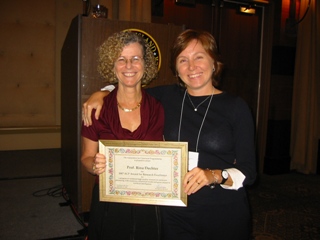2007 ACP research excellence award to Rina Dechter
 ACP is the
Association of Constraint Programming.
Its announcement of the ACP 2007 research excellence award reads as
follows:
ACP is the
Association of Constraint Programming.
Its announcement of the ACP 2007 research excellence award reads as
follows:
For the third time we are giving
the "ACP award for Research Excellence in constraint programming",
whose purpose is to celebrate those CP researchers who have made
exceptional and very influential research contributions to CP with
their work.
This year the award committee, consisting of Francesca Rossi, Pedro
Meseguer, Christian Bessiere (program chair of CP 2007), Eugene Freuder
and Pascal Van Hentenryck (the receipients of the last two research
awards), decided to give the 2007 ACP award on research excellence on
constraint programming to Rina Dechter, for a program of sustained high
quality research in constraint processing, with numerous influential
results and great impact on Artificial Intelligence.
Rina's nomination was presented by Javier Larrosa, who put together an
excellent nomination package consisting of very enthusiastic support
from seven leading researchers in CP, AI, and DB.
Rina Dechter obtained her Ph.D. in Computer Science from UCLA in 1985
with Judea Pearl. She the remained there until 1987 as a post-doc and
in 1988 as a research associate. She then joined the Technion in Israel
as senior lecturer from 1988 to 1990, and finally she joined UC Irvine
in 1990, where she is now full professor of computer science.
Rina's research activity is very extensive (she has published 90
conference papers and 35 journal papers) and includes several
pioneering and very influential structure-based techniques, such as
directional consistency, adaptive consistency, tree clustering,
cycle-cutset schemes, backjumping, and search-based non-good learning.
Moreover, she introduced the temporal constraint framework, which is
central in any scheme for planning and scheduling, including
applications such as the NASA Deep Space project. She also defined the
bucket elimination framework, which unifies dynamic programming for
combinatorial optimization, probabilistic reasoning, and planning under
uncertainty, obtaining very inspiring and influential results in all
these fields.
Her book "Constraint Processing", published in 2003, covers most of the
main notions and techniques in constraint processing, and has been very
instrumental for the dissemination and visibility of CP, as well as the
creation of a uniform body of knowledge, the birth of new university
courses on CP, and the introduction of new young people to the field.
Rina's numerous and very influential results have inspired a whole
generation of CPers, as well as researchers in planning, scheduling,
knowledge representation and reasoning, uncertainty, probabilistic
inference, and combinatorial optimization.
Award talk Slides
 ACP is the
Association of Constraint Programming.
Its announcement of the ACP 2007 research excellence award reads as
follows:
ACP is the
Association of Constraint Programming.
Its announcement of the ACP 2007 research excellence award reads as
follows: